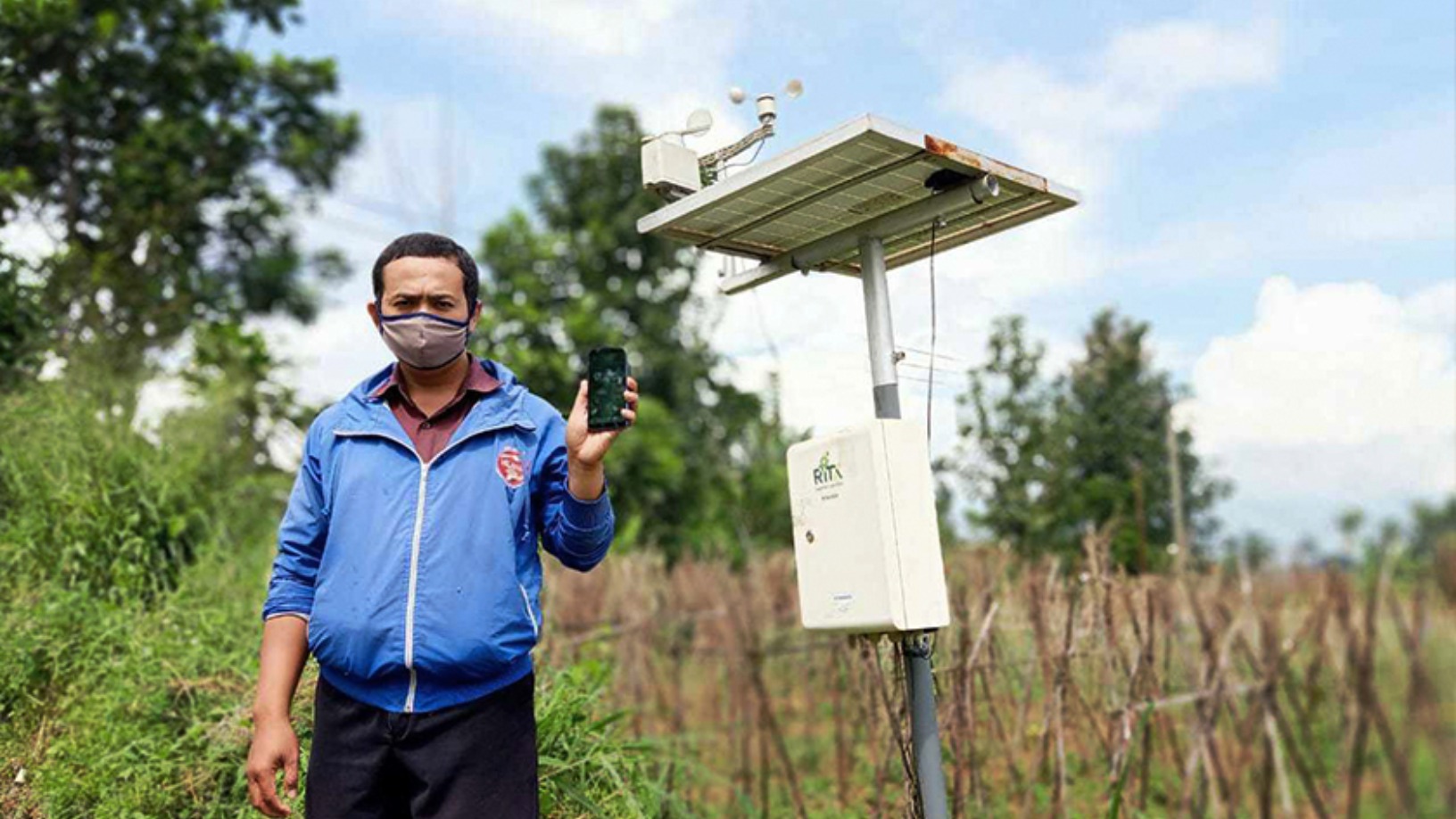Indonesia’s farmers face many challenges, from unscrupulous off-takers to difficulties in getting loans. One of the biggest challenges right now, however, is climate change. Traditional farmers who rely on centuries-old knowledge of weather patterns have to grapple with drastic changes in weather patterns, such as extreme temperatures and other weather phenomena. More than ever, they need help in understanding the conditions on their farmland.
Local agritech startup MSMB is one of a few players in Indonesia tackling this issue. Using a combination of weather and soil sensors that detect and allow tracking of local weather patterns and ground conditions, it processes the data collected to provide guidance for its farmer clients. MSMB’s technology has been implemented in 22 regencies across Indonesia in conjunction with government agencies and major private companies that off-take agricultural products.
MSMB’s work has won accolades outside Indonesia, including the HERMES Startup Award at the 2020 Hannover Messe. But the startup, which develops its own sensors, wants to do more than help farmers obtain and understand information.
Backed by Myanmar-based conglomerate UMG through its VC arm Idealab, it’s setting out to build an ecosystem where farmers can get wider access to buyers as well as to loans to grow their businesses. Also on the cards are livestock and fish farming, where MSMB can leverage its expertise.
According to MSMB’s CMO Ari Cahyono, who spoke to CompassList by video call, work on the technology that would become part of MSMB started in 2008 as part of UGM’s agricultural research projects. Commercialization of years of research began in earnest in 2018, backed by a team of 15 members and the financial support of Idealab.
Commercializing academic research
MSMB was established by Bayu Dwi Apri Nugroho, a lecturer at Universitas Gadjah Mada (UGM) – one of Indonesia’s most prestigious universities – and Kiwi Aliwarga, the Indonesian founder of Myanmar-based diversified conglomerate UMG. Its full name, “Mitra Sejahtera Membangun Bangsa," speaks of their hopes and can be translated as “partners in prosperity, developing the nation.”
The research projects originated in concerns about how climate change was affecting the lives of Indonesia’s traditional farmers.
“They can’t rely on gut feeling or old patterns anymore because climate change has changed weather patterns significantly,” said Cahyono. “Weather data provided in forecasts usually cover a wide area, but the weather is likely to be different in each village.”
Farmers can’t rely on gut feeling or old patterns anymore because climate change
MSMB thus began by combining a weather sensor and a soil sensor, allowing farmers to get localized weather updates and a precise understanding of the soil conditions on their farm. The data is sent to cloud storage and processed on MSMB’s platform, named RiTx Bertani ("RiTx Farming"). The platform sends the results and recommendations automatically to farmers using a mobile app. This gives them a quick overview of what is happening on their farm and what they can do to maintain optimal conditions for their crops.
Building an agritech ecosystem
The company does most of its work with government agencies, from the Ministry of Agriculture (and its local offices) to the Bank of Indonesia, the country’s central bank. It has also worked with the Asian Development Bank and the Ministry of Communication to map 2,000 hectares of land using drones in order to study the best placement for its sensors and support the government’s smart farming initiative.
Cahyono admits that all of these technologies are still too expensive for most smallholding farms in Indonesia. For this reason, MSMB mostly works with government agencies and industrial-scale farms.
For more in-depth research and insights about Indonesian agritech, the full Indonesia Agritech Report 2020 by CompassList is now available online to all readers.
Still, the startup has managed to involve the private sector as well, working with companies such as food producer JAPFA and traditional medicine manufacturer SOHO Global Health to provide RiTx to farmers. In these collaborations, the farmers use a credit program to pay rental fees for the sensors while the companies buy the farmers’ crops directly.
Recognizing that farmers also struggle to sell their harvest at fair prices, MSMB has built RiTx Market, a B2C marketplace that allows farmers to sell directly to home buyers. Finally, rounding off the ecosystem, MSMB works with state-owned banks BNI and BRI, as well as private bank BCA, to help them disburse affordable loans to farmers. These banks are increasingly working with P2P lending platforms such as Investree, TaniFund and KoinWorks to reach out to MSMEs, especially in rural areas where banks have limited physical reach.
We want to go beyond technology and solve other problems in this space
“We want to go beyond technology and solve other problems in this space,” said Cahyono. “We are creating an integrated ecosystem where farmers can get affordable farming supplies, credit from banks, agriculture insurance, access to markets, and government assistance in one place.”
Delayed plans and hope
MSMB’s next step in developing this ecosystem is to branch out into the fish farming industry. A new vertical dubbed FisTx provides similar types of services to RiTx – real-time data sensing and recommendations – for fish and prawn farmers.
Cahyono said that FisTx can also help farmers record what they do on the farm every day, which is an important data point for business customers that demand traceability in their food. The project has been implemented in a fish farm in Trenggalek, East Java province, and they are finalizing deals to work on other fish farms.
The company is also setting its sights on livestock farming. Next on their priority list is developing a new platform for managing cattle, named LiTx. While Cahyono did not give details, he mentioned that MSMB is considering sensors that can track a cow’s vital statistics in order to give farmers a quick understanding of their animals’ health.
For now, however, the company has to cope with the effects of Covid-19. Nationwide limitations on travel and in-person meetings, as well as budget constraints, have put many of MSMB’s projects on hold. This includes the project with the central bank, which aims to fight food price inflation by ensuring efficiency and fair trading through the MSMB ecosystem.
“We projected that we could reach profitability this year, but with Covid-19 happening it’s delayed our field work and meetings with potential clients," said Cahyono.
While work in the B2B side has stalled, MSMB has enjoyed a boost in sales of produce through its B2C marketplace. Between April and May this year, sales have increased threefold, although Cahyono declined to elaborate on the numbers. He said that RiTx Market is available only in Yogyakarta and Solo at the moment as MSMB handles logistics and packaging. The company is working to provide the service to the Greater Jakarta area as well.
“With markets closed and distribution channels disrupted, agritech companies can step in to connect buyers and sellers directly,” said Cahyono. “We need to make sure we have the distribution partners and infrastructure such as warehouses, and of course sourcing the vegetables from the farmers to meet the demand.”











